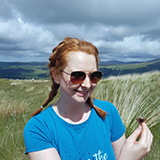Melissa Minter

PhD topic title: Buffering climate-driven extinctions in montane butterfly species: are there genetic refuges?
PhD supervisors: Professor Jane Hill and Dr Kanchon Dasmahapatra
Biography and research
After completing a BSc in Geography & MSc in Biodiversity and Conservation I started my career in education working for the charities Yorkshire Wildlife Trust, Norfolk Wildlife Trust and IntoUniversity. I then gained a position at Rothamsted Research as a research assistant in the Insect Migration Genetics group, working on flight mill technology and the agricultural pest Helicoverpa armigera.
My interest in entomology grew and in particular the conservation aspect, which is why I applied for my PhD project looking at the genetics in northern butterflies under climate change.
My PhD research project studies the genetics of retreating populations of montane/northern butterfly species in Britain to determine the extent to which refugial populations are locally adapted and hence buffered from anthropogenic climate change. Under their remit to protect UK biodiversity, Government Statutory Agencies (Natural England and Scottish Natural Heritage) need to identify species at risk from climate change.
Evidence that UK species contain unique genotypes and that some refugial populations may be buffered from the effects of climate change will help prioritise populations for protection, leading to new ways of managing landscapes under climate change.
Funder
- NERC iCASE NPIF (CASE partners: Natural England and Scottish Natural Heritage)